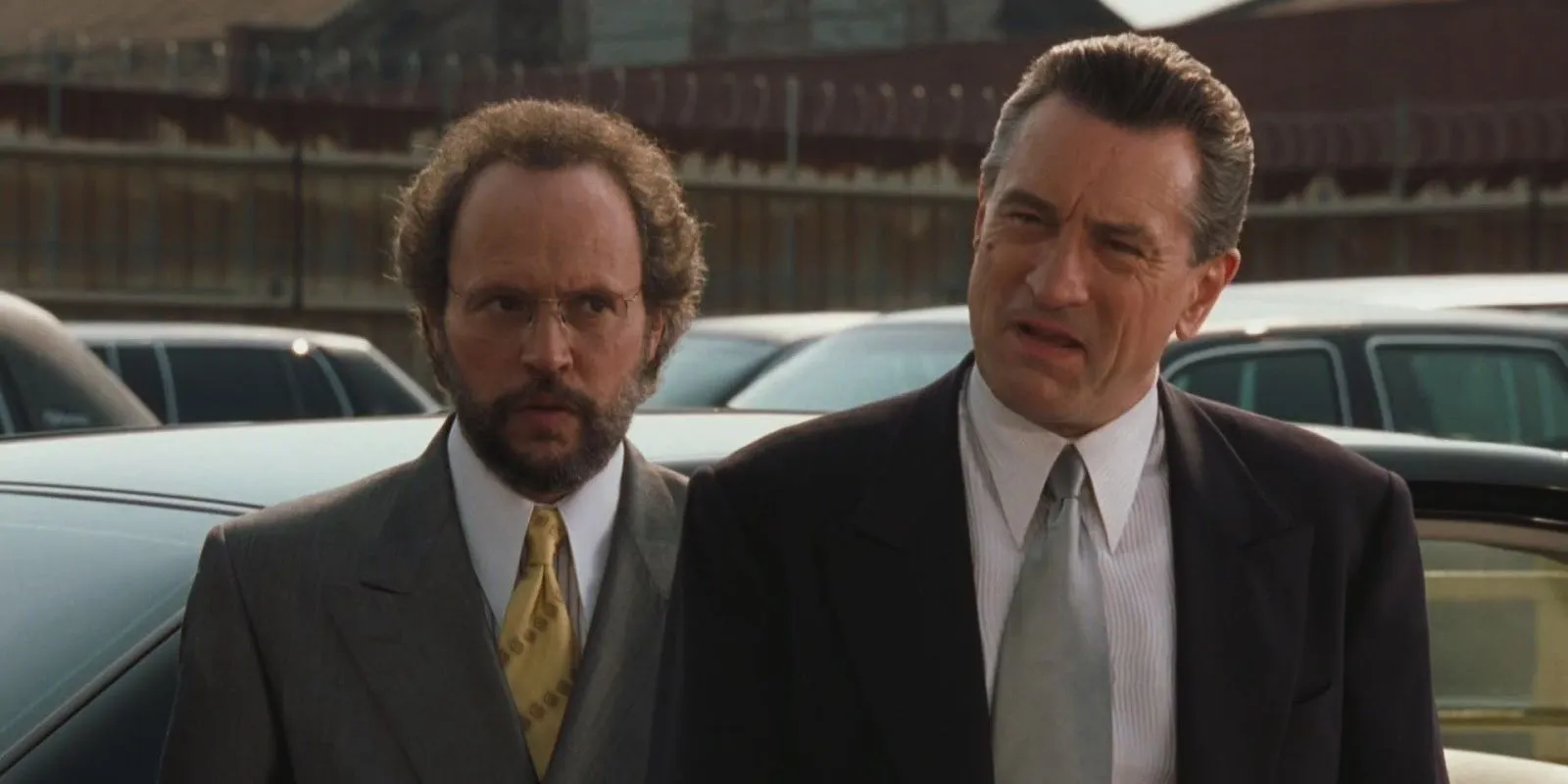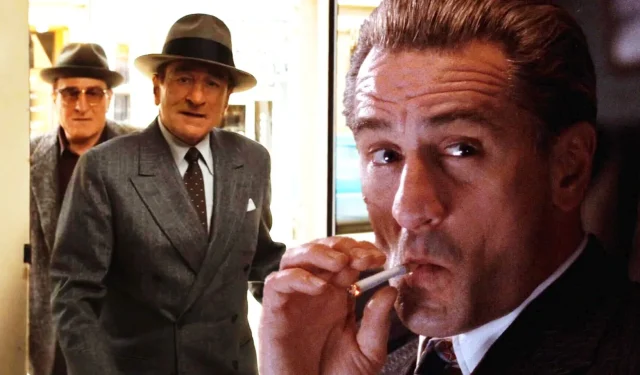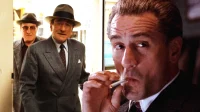In the realm of gangster cinema, Robert De Niro stands out as an iconic figure, with his performances spanning an impressive spectrum from the forgettable to the unforgettable. Throughout his illustrious career, De Niro has explored various genres, portraying memorable roles in comedies such as Meet the Parents, war epics like The Deer Hunter, and thrilling action films such as Midnight Run.
However, De Niro is most closely associated with crime dramas. His repertoire includes notable films that do not revolve around the mafia, such as Jackie Brown and American Hustle. Nevertheless, his Italian-American heritage and partnerships with directors like Martin Scorsese often land him in roles as mobsters, leading to classics like The Godfather Part II as well as disappointments like Analyze That.
13. The Gang That Couldn’t Shoot Straight
Comedic Crime Chaos
De Niro’s early lead role in the gangster comedy The Gang That Couldn’t Shoot Straight showcased his comedic potential. The film seeks to portray mobster Joe Gallo’s life through an absurd lens, but suffers from heavy-handed direction that undermines its humor. The performances lean towards over-exaggeration, detracting from its comedic effectiveness.
12. Analyze That
Therapy and Turf Wars
Sequels rarely recapture the charm of their predecessors, and Analyze That is no exception. Following mob boss Paul Vitti’s ongoing therapy with Dr. Ben Sobel, the film lacks fresh comedic insights, rendering the initial joke stale. Despite the solid chemistry between De Niro and Billy Crystal returning on screen, the film delivers fewer laughs than its predecessor.
11. Mad Dog And Glory
Romantic Mob Entanglements
In a surprising twist, De Niro collaborates with Bill Murray in Mad Dog and Glory. De Niro plays a meek Chicago detective who has never fired his weapon, while Murray portrays a dangerous gangster. When the detective saves the gangster’s life, he is rewarded with a unique offer of his moll, played by Uma Thurman. Despite some casting incongruities, this film succeeds as an eccentric romantic comedy.
10. The Alto Knights
In his latest outing, The Alto Knights, De Niro portrays dual roles as rival mobsters Frank Costello and Vito Genovese. While the narrative does not demand this duality, De Niro excels, particularly as the fiery and temperamental Vito, reminiscent of Junior Soprano. Though it channels the stylistic flair of Scorsese, it ultimately lacks the depth and authenticity of his more profound works, making it a light yet enjoyable gangster film.
9. Analyze This
Psychological Mob Comedy

Although its sequel faltered, Analyze This remains a beloved comedy classic. De Niro and Crystal display an incredible dynamic as a menacing mobster and his exasperated therapist. With a sharp script by Harold Ramis and deeply textured characters crafted by playwright Kenneth Lonergan, Analyze This exemplifies the success of a high-concept comedy.
8. The Untouchables
Prohibition Era Showdown
Reuniting with director Brian De Palma, De Niro portrayed Al Capone in the thrilling crime drama The Untouchables. While the film takes creative liberties with actual events, it remains a standout in the genre, showcasing unforgettable scenes, including Capone’s brutal beating of a lieutenant. Though historical accuracy may be questionable, the film provides an exhilarating cinematic experience.
7. Mean Streets
Early Urban Grit
The collaboration between De Niro and Martin Scorsese begins with Mean Streets, a character-focused narrative featuring young mafioso Charlie (Harvey Keitel) struggling to reign in his wild friend Johnny Boy (De Niro). De Niro’s delightfully sinister portrayal steals the spotlight, juxtaposed against Keitel’s understated performance. This film effectively laid the groundwork for the duo’s authentic representation of mob life.
6. A Bronx Tale
Neighborhood Loyalty and Lessons
In his directorial debut, A Bronx Tale, De Niro crafts a poignant coming-of-age narrative centered on a young Italian-American man’s conflict between his father’s working-class ethos and the allure of a mob boss’s lifestyle. De Niro adeptly elicits a spectrum of emotions ranging from humor to heartbreak, and Chazz Palminteri’s semi-autobiographical script enriches this cinematic experience.
5. Casino
Vegas Vice and Violence
Although Casino replicates some stylistic elements from Goodfellas, it retains its own distinctiveness as a grand crime saga. De Niro’s intensive dynamic with Sharon Stone, at the peak of her career, emerges as a highlight in this tale chronicling the seedy underbelly of Las Vegas gambling. The film serves as another cautionary narrative of the life of a gangster, marking De Niro’s continued exploration of organized crime themes.
4. Once Upon A Time In America
Epic Gangster Saga
In his final directorial endeavor, legendary filmmaker Sergio Leone unveils his long-cherished project, Once Upon a Time in America. The exhaustive film charts the rise of two Jewish gangsters, portrayed by De Niro and James Woods, within New York’s criminal landscape. At nearly four hours, it may lack tightness and coherence compared to Leone’s earlier works, yet remains a significant artistic accomplishment.
3. The Irishman
Late-Career Reflection
De Niro and Scorsese combine their storytelling talents to impart a powerful message about the consequences of a life of crime in The Irishman. Each character’s introduction is notably accompanied by their impending fate. De Niro embodies Frank Sheeran, a hitman entangled with the mysterious disappearance of union leader Jimmy Hoffa. While more somber and contemplative than Goodfellas, the film serves as an introspective examination of the toll of a criminal lifestyle.
2. The Godfather Part II
Expanding the Corleone Legacy
Taking on the iconic role of Vito Corleone in The Godfather Part II, De Niro also showcases the complex narrative structure juxtaposing Michael’s moral descent with Vito’s rise to power. This sequel is the quintessential example of cinematic brilliance, delving even deeper into themes of morality while expanding on the original portrayal of the American Dream’s dark facets.
1. Goodfellas
Iconic Mob Chronicle
While The Godfather Part II is a contender, De Niro’s role in Goodfellas stands as perhaps his most definitive portrayal. The energetic direction of Scorsese—through freeze frames, voiceover narration, dynamic editing, and vivid soundtracks—immerses viewers in the electrifying lifestyle of the mafia. De Niro’s character, Jimmy Conway, delivers some of the actor’s most memorable moments, blending grief and cold-bloodedness in a masterful display of range.


